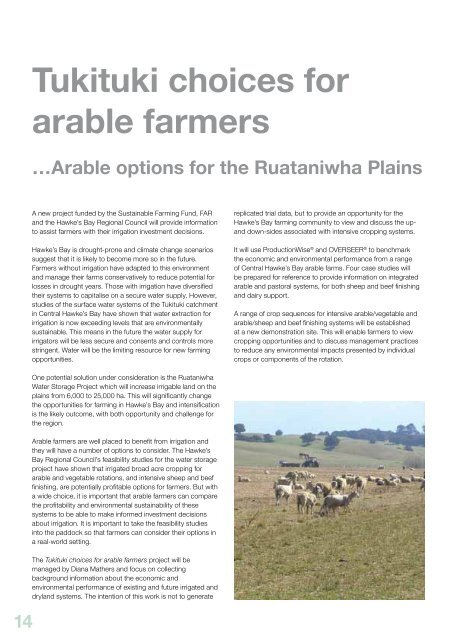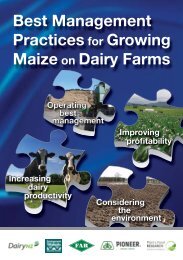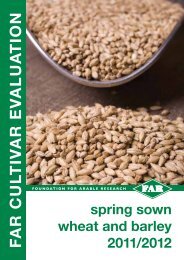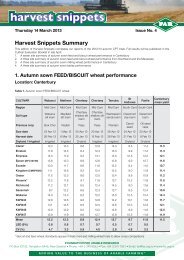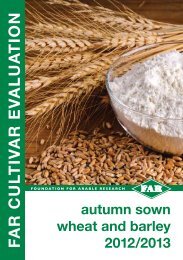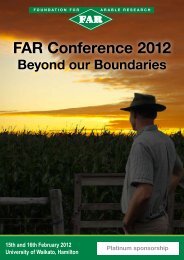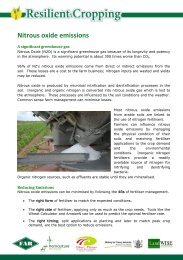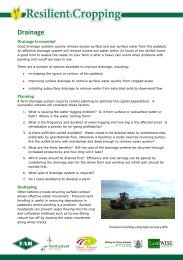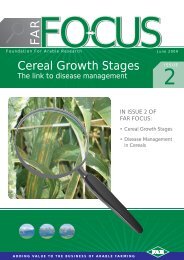Create successful ePaper yourself
Turn your PDF publications into a flip-book with our unique Google optimized e-Paper software.
Tukituki choices <strong>for</strong><br />
arable farmers<br />
…<strong>Arable</strong> options <strong>for</strong> the Ruataniwha Plains<br />
A new project funded by the Sustainable Farming Fund, FAR<br />
and the Hawke’s Bay Regional Council will provide in<strong>for</strong>mation<br />
to assist farmers with their irrigation investment decisions.<br />
Hawke’s Bay is drought-prone and climate change scenarios<br />
suggest that it is likely to become more so in the future.<br />
Farmers without irrigation have adapted to this environment<br />
and manage their farms conservatively to reduce potential <strong>for</strong><br />
losses in drought years. Those with irrigation have diversified<br />
their systems to capitalise on a secure water supply. However,<br />
studies of the surface water systems of the Tukituki catchment<br />
in Central Hawke’s Bay have shown that water extraction <strong>for</strong><br />
irrigation is now exceeding levels that are environmentally<br />
sustainable. This means in the future the water supply <strong>for</strong><br />
irrigators will be less secure and consents and controls more<br />
stringent. Water will be the limiting resource <strong>for</strong> new farming<br />
opportunities.<br />
replicated trial data, but to provide an opportunity <strong>for</strong> the<br />
Hawke’s Bay farming community to <strong>view</strong> and discuss the upand<br />
down-sides associated with intensive cropping systems.<br />
It will use ProductionWise ® and OVERSEER ® to benchmark<br />
the economic and environmental per<strong>for</strong>mance from a range<br />
of Central Hawke’s Bay arable farms. Four case studies will<br />
be prepared <strong>for</strong> reference to provide in<strong>for</strong>mation on integrated<br />
arable and pastoral systems, <strong>for</strong> both sheep and beef finishing<br />
and dairy support.<br />
A range of crop sequences <strong>for</strong> intensive arable/vegetable and<br />
arable/sheep and beef finishing systems will be established<br />
at a new demonstration site. This will enable farmers to <strong>view</strong><br />
cropping opportunities and to discuss management practices<br />
to reduce any environmental impacts presented by individual<br />
crops or components of the rotation.<br />
One potential solution under consideration is the Ruataniwha<br />
Water Storage Project which will increase irrigable land on the<br />
plains from 6,000 to 25,000 ha. This will significantly change<br />
the opportunities <strong>for</strong> farming in Hawke’s Bay and intensification<br />
is the likely outcome, with both opportunity and challenge <strong>for</strong><br />
the region.<br />
<strong>Arable</strong> farmers are well placed to benefit from irrigation and<br />
they will have a number of options to consider. The Hawke’s<br />
Bay Regional Council’s feasibility studies <strong>for</strong> the water storage<br />
project have shown that irrigated broad acre cropping <strong>for</strong><br />
arable and vegetable rotations, and intensive sheep and beef<br />
finishing, are potentially profitable options <strong>for</strong> farmers. But with<br />
a wide choice, it is important that arable farmers can compare<br />
the profitability and environmental sustainability of these<br />
systems to be able to make in<strong>for</strong>med investment decisions<br />
about irrigation. It is important to take the feasibility studies<br />
into the paddock so that farmers can consider their options in<br />
a real-world setting.<br />
14<br />
The Tukituki choices <strong>for</strong> arable farmers project will be<br />
managed by Diana Mathers and focus on collecting<br />
background in<strong>for</strong>mation about the economic and<br />
environmental per<strong>for</strong>mance of existing and future irrigated and<br />
dryland systems. The intention of this work is not to generate<br />
!


